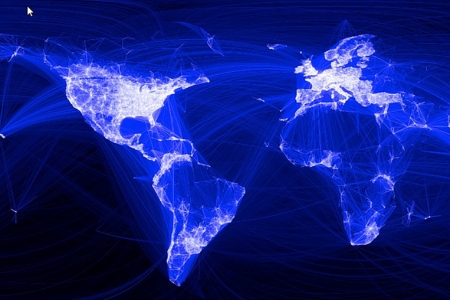You are here
Blog: Digital Trade has advantages for all of us
Digital Trade may seem like an abstract concept, but its reality is a European bank using state-of-the-art cyber security centres around the world to protect customers’ data 24/7.

By Nicholas Hodac, Chair of the AmCham EU Transatlantic TF, Government and Regulatory Affairs Executive, IBM Europe
Or a European SME that exporting cutting-edge video-editing software to Hollywood or Bollywood. Or a major European car company using a global cloud infrastructure for its global car-sharing app so that customers can find the cheapest and fastest way to travel. Moreover, every study on Digital Trade – including this 2015 research from the Lisbon Council – shows that it can visibly move the GDP needle of a country.
Trade agreements around the world must fully embrace digital trade to be able to cultivate truly digital societies and economies. While the recent EU-Japan Free Trade Agreement was a significant achievement, the absence of data flows provisions from it is a step backward in driving digital innovation and growth.
Data flows are the basis for the internet to be an international trade platform. The ability to transfer data freely and securely across borders, in compliance with data protection rules, is essential for any full functioning trade relationship. The alternative to data flows is data localisation and that - to quote European Commission Vice-President Andrus Ansip - is ‘a dead end.’ Having access to advanced analytics using data from across the globe is a significant competitive advantage to companies of all sizes. And access to data-driven insights is being made available to more and more people, putting the power of data analytics in the hands of citizens rather than in the hands of a select few.
There are other barricades to digital trade. Several countries around the world will only give access to their digital markets if businesses provide access to source code and encryption keys to the software they use. This is an example of local content requirements and local performance requirements. Additionally, some countries impose the use of local technologies as a requirement for public procurement contracts, meaning the best technologies are not always used and the end result suffers. This trend towards “digital protectionism” runs counter to the interests of countries who want digital services to play a key role in their strategies for long-term economic growth.
The case for open trade is even stronger with the rise of the Internet of Things (IoT). Open trade will drive compatible IoT approaches from in different markets. For example, if hospitals in the US and the EU want to send electronic health records across the Atlantic for analysis that could help identify disease causes or develop innovative treatment plans, compatible formats will ensure quicker results.
We live in an age where the global movement of data can change life for the better. It can help people access innovative medical treatments, or it can help researchers find new answers to some of the world’s most challenging questions.
Digital trade has upsides for all of us.
